Cuba

On my first trip to Cuba in 2022, I met Jorge González Nuñez, president of the Movimiento Estudiantil Cristiano de Cuba (MEC). I asked how he would describe the situation the Cuban people were living in, impacted by the U.S.’ decades-old trade embargo and other policies introduced by the administrations of former President Donald Trump and President Joe Biden, from a theological perspective. His answer stuck with me.
“The Cuban people are going through a crucifixion,” he said without hesitation. “It is hard to have hope.”
He paused and then added, “But there is resurrection.”
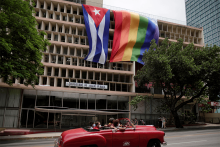
Cubans celebrated the results of a landmark referendum on Sept. 25 that legalized same-sex marriage, redefined the legal family, expanded rights for the elderly and children, and more.
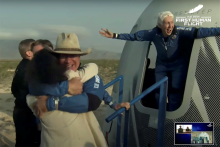
There’s more than one way to tell a story. As journalists, we know this well. As readers, you know this well. The news this week gave us ample opportunities to remember that stories can be told with different — sometimes even contradictory — purposes.
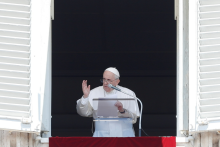
“Let us put a halt to the frantic running around dictated by our agendas. Let us learn how to take a break, to turn off the mobile phone,” Pope Francis said in his weekly address from a window overlooking St. Peter’s Square.

Abuelita theology is birthed from the reality that in Latine religious culture, matriarchal figures serve as the core of preserving and passing on religious traditions, beliefs, practices, and spirituality within the family.
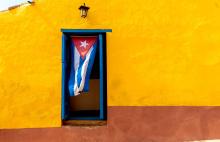
IN MARCH, I visited Cuba on a 10-day tour with alumni from Eastern Mennonite University. I’ve studied the socialist structure of the early Jerusalem church (as recounted in Acts 2-6), and I wanted to experience Cuban socialism directly and see how it compares. How, for example, have Christian churches fared under a one-party socialist government?
On our visit, we heard about Cuba’s successes in the areas of health care and education. We heard a lecture on the massive effort to bring Cuba’s average level of education from third grade in 1959 to the current 11th grade. We learned about Cuba’s universal free health care, and that local clinics throughout the island provide basic care accessible to every citizen. As a result, infant mortality is lower than in the U.S. and overall life expectancy is about the same, according to The Atlantic—even though the U.S. spends more than 10 times as much per person per year on health care.
Such basic needs have been met not by Christian churches but by a government that initially robbed the wealthy and shared it with the poor. What were Christians in Cuba—Catholics, Protestants, Anabaptists, and Jehovah’s Witnesses—to make of this enormous shift toward economic equality? After the revolution, most missionaries returned to their home countries, and thousands of Cubans, Christians and otherwise, fled to the United States. Christians who remained had to rethink their mission in a society where the poor were educated and healed through structural change rather than individual charity.
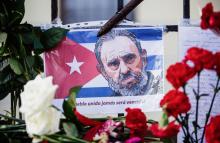
There was something changing — on my more recent visits, people have been publicly talking politics in ways they previously would have done only behind closed doors. Yet with U.S. President-elect Donald Trump now threatening to roll back Obama’s strides in U.S.-Cuba relations, it’s hard to say how many Americans will get to meet this Cuba.
U.S. law stipulates that the U.S. embargo cannot be lifted unless both Castros exit power. Raul Castro says he’ll leave office in 2018. What’s the likelihood of any successor being moderate enough for Trump — or willing to let the real estate mogul near the island’s beachfront property and historic Havana hotels?
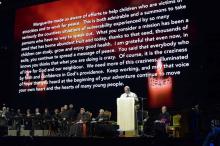
Even by this pope’s standards it was a bold move.
Francis, the spiritual leader of more than a billion Roman Catholics across the globe, this week traveled to Sweden, one of the most secularized countries in Europe, to take part in events marking 500 years since Martin Luther kickstarted the Protestant Reformation.
1. Watch Warsan Shire, Poet Behind Beyonce’s ‘LEMONADE’ Read Her Poem on Female Genital Mutilation
The Somali-British poet was named the first Young Poet Laureate for London when she was 25.
2. Called to Resist Bigotry — A Statement of Faithful Obedience
More than 50 Christian leaders take on the racism, xenophobia, and misogyny of the 2016 election cycle.
1. Pope Celebrates Holy Week by Washing the Feet of Refugees
A lovely alternative to the hateful rhetoric currently being spewed in the U.S.
“As we stand this Holy Week, we pause to name the agonizing crucifixion and the promise of resurrection of Black women and girls worldwide. … We call forth healing. We call forth wholeness. We call forth rest.”
3. What Happened to the Jesus People?
Were they really swallowed by the conservatism of leading evangelicals and a fatal decline of Protestant liberalism?
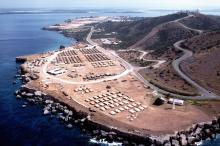
We are in Cuba. More specifically, 14 members of Witness Against Torture are in the Department of Guantanamo, at the Mirador overlooking the U.S. Naval Base. We are being hosted by the staff of La Gobernadora restaurant and lounge. From the lookout, we can see the U.S. base that has occupied more than 100 square kilometers of Cuban land for more than a century. We can orient ourselves toward the camps where the Abd and Mohammed and their brethren are being held. We are camping. We are praying. We are acting. We are transforming a random international tourist spot — one more site to click photos, drink a beer, and move on from before heading to the beaches — into a place to honor and connect and extend ourselves toward the men our nation has demonized and then forgotten.

Recently, several human rights groups noted that the U.S. State Department has upgraded the status of some countries, notably Malaysia and Cuba, regarding human trafficking in order to improve diplomatic relations with those countries. Human trafficking, which is modern day slavery, is the illegal buying and selling of people, typically for forced labor or forced prostitution.
As a human rights worker, I know it is vitally important to tell the truth about human rights and to not falsify official reports about human rights in order to achieve diplomatic goals.
Human rights workers are rarely “purists.” They fight a lonely battle, often knowing there is little they can do in the offending country and knowing that “good” countries such as the US often will choose to elevate diplomatic goals over human rights goals. That is a fact of life. But when we make such choices, we must do so knowingly, with our eyes open, and not falsify reports or documents in order to sanitize our decisions.
Our official reports must have credibility. The whole point of preparing Trafficking In Persons (TIP) reports — or, for that matter, any human rights reports — is to provide a solid basis for analyzing the problem and identifying the countries involved. Once the U.S. is known to “cook the books” on the TIP reports, it loses its moral authority.

AS THIS IS written, the U.S. and Cuba are in the final stages of the haggling that will likely lead to the opening of embassies in Havana and Washington, and peace, love, and understanding seem to be breaking out all over. Pope Francis, who helped broker the U.S.-Cuba thaw, will visit the island in September on his way to the U.S. After a recent meeting with the pope, Cuban President Raul Castro said, “if the pope continues to talk as he does, sooner or later I will start praying again and return to the Catholic Church.” And Major League Baseball is already working on bringing at least spring training games back to baseball-crazy Cuba.
In the U.S. media, discussion of the new détente with Cuba has focused almost entirely on the past 55 years of Cold War-inspired confrontation. However, the U.S. and Cuba had a close and troubled relationship for a full 60 years before Fidel Castro took power, and as hostilities wane and the U.S. economic embargo against Cuba is eventually dropped, the patterns of this U.S.-Cuban “prehistory” may become important again.
That story begins in 1898, when the U.S. empire first extended beyond our North American shores as the U.S. took control of Cuba, Puerto Rico, and the Philippines at the end of the Spanish-American War. Puerto Rico we still hold.

The Vatican on June 30 released details of Pope Francis’ itinerary for his Sept. 22-27 U.S. visit, his first, and it shows how this “pope of the people” wants to avoid becoming a prisoner of the East Coast “power corridor” during his five days in Washington, New York, and Philadelphia.
For example, organizers have added visits to a Catholic Charities food program in downtown Washington, a Catholic school in Harlem that serves largely Latino immigrant children, and a prison in Philadelphia to meet with inmates and some of their families.

IN OAKLAND, CALIF., schools and other nontraditional sites host health clinics that provide both primary care and preventive health services for area residents, many of whom are uninsured.
In south Los Angeles, mental health professionals have created programs based on nutrition and group exercise, along with peer-to-peer education about the transmission of HIV/AIDS. Community groups, faith-based organizations, schools, and health providers are coming together in Albuquerque, N.M., to enroll hundreds of children in Medicaid and start neighborhood walking groups—part of an effort to break down walls between health-care providers and their patients
The U.S. health-care system is known for treating advanced-stage illnesses with expensive therapies that are often not accessible to those without health insurance. So if these low-cost, preventative programs in Oakland, LA, and Albuquerque don’t sound like the typical U.S. approach to health, you’re right: These and other community-based efforts trace their inspiration to the remarkably successful health system built by the nation of Cuba.

Contemporary History
The duo Ibeyi are Naomi and Lisa-Kaindé Díaz, 19-year-old French-Cuban twins with Yoruba roots—a West African culture transplanted to Cuba during slavery. Ibeyi’s self-titled album begins and ends in prayer; in between is a fusion of English and Yoruba, minimalist piano and percussion, jazz and hip hop. XL Recordings
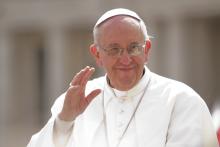
Pope Francis will visit Cuba before arriving in the United States in September, the Vatican said April 22.
Rev. Federico Lombardi, Vatican spokesman, confirmed the news to reporters in a statement made in Italian, Spanish, and English.
“I am able to confirm that the Holy Father Francis, having received and accepted the invitation from the civil authorities and bishops of Cuba, has decided to pay a visit to the island before his arrival in the United States for the trip announced some time ago,” Lombardi said.
The pope is scheduled to visit Washington, New York City, and Philadelphia starting around Sept. 23.
Francis would be the third pope to visit Cuba, after St. John Paul II in 1998 and Pope Emeritus Benedict XVI in 2012.
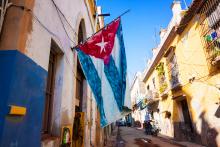
THOUGH SOME HAVE accepted “axis of evil” characterizations of Cuba and North Korea, my experiences of the two countries—nine visits to Cuba and one week in North Korea—have led me to far different conclusions: There are very few similarities between the two nations, and neither is inherently “evil.”
Music infuses the air in Cuba as in no other of the 60 countries to which I’ve traveled. The streets are alive. Children play baseball and soccer in the streets. Cafes, parks, and other public places are crowded and noisy. Nearly everyone I’ve met has treated me like a long-lost friend, even more so when they learn I’m American. There is a natural affinity between Cubans and Americans. More than 100 flights a week ferry people between Havana and Miami.
In North Korea, the streets are eerily quiet. There is virtually no visible human interaction. North Koreans are forbidden to make eye contact with Westerners. There appear to be no public gathering places except the massive government plazas where military parades and government rallies are staged. I was never allowed to go anywhere without a “minder.” I traveled with a Presbyterian Church (U.S.A.) official who was born in North Korea and returns there frequently. His counsel: “Assume that everywhere you go you are followed and that every conversation you have, no matter where, is bugged.” His relatives received permission to travel from their home village to Pyongyang to visit him. In our hotel room, he turned the television volume up to full blast before they began talking quietly. On one early morning walk near our hotel (the only time I was unescorted), I took a few photographs. By the time I returned to the hotel, government representatives were waiting in the lobby, demanding to see all my photos and instructing me on which ones to delete.
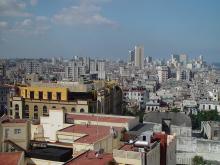
Alan Gross, the Jewish international aid worker held on alleged spy charges in Cuba for five years, was freed on Dec. 17 — what some are calling a Hanukkah miracle on the first day of the holiday that celebrates religious freedom.
Gross, 65, of Maryland, has always claimed that he only went to Cuba to bring communications equipment to the small Jewish community left in Havana. However, the Castro government said he was part of a spy network attempting to set up a secret network for Cuban Jews. Gross was serving a 15-year sentence.
President Obama chose the Dec. 17 release as a springboard to announce a massive historic “normalization” of U.S.-Cuba relations. Meantime, in Cuba, President Raul Castro, who held a press conference in Havana at noon, was expected to release 53 Cuban political prisoners.
Obama particularly credited the “moral example of Pope Francis,” who actively encouraged Gross’ release. Francis, who held private meetings at the Vatican to secure the deal, praised the move, sending “his warm congratulations for the historic decision taken by the Governments of the United States of America and Cuba to establish diplomatic relations, with the aim of overcoming, in the interest of the citizens of both countries, the difficulties which have marked their recent history.”

NOVEMBER MARKS the 50th anniversary of the assassination of our 35th president, an event that defined the life of the baby-boomers—a generation that, by sheer force of numbers, still sucks up most of the oxygen in U.S. culture. There are new books, reissued books, documentaries, made-for-TV movies, and a new Hollywood production, Parkland, starring that Everyman of the baby boom, Tom Hanks. But, anniversary hoopla aside, the JFK assassination and its aftermath can also provide us with some very timely lessons about the dangers that come with secret wars and unaccountable power.
Fifty-nine percent of Americans don’t believe the official story that Lee Harvey Oswald alone killed President John F. Kennedy, and this time the majority is right. The available evidence strongly suggests that the president was the victim of a murder plot that involved anti-Castro Cubans, enraged by his failure to back them up during the Bay of Pigs invasion, and their allies in organized crime who had been heavily invested in pre-Castro Havana. That was the conclusion of the House Select Committee on Assassinations in 1978, which also found physical evidence of another shooter at the crime scene.
Of course, the armed anti-Castro forces in Florida were a bought-and-paid-for creation of our CIA, and the CIA was also working with organized crime figures in various plots to assassinate Castro. So it’s no great leap to suspect some complicity in Kennedy’s assassination by CIA employees. Some reasonable people, including peace activist and theologian James W. Douglass in his book JFK and the Unspeakable, have gone further, claiming that the Kennedy assassination was the result of a policy decision, taken at the very highest levels of the national security state, aimed at heading off JFK’s plans to pull out of Vietnam and end the Cold War. This theory relies heavily on National Security Action Memorandum 263, which laid out plans to begin withdrawing troops from Vietnam, and journalist Norman Cousins’ account of back channel diplomacy in the book, The Improbable Triumvirate: John F. Kennedy, Pope John, Nikita Khrushchev.